Bridging the gap
Discover our impact in 2023, as we partnered with small charities, people and communities across England and Wales to collaboratively create a more just and compassionate society.
Discover our impact in 2023, as we partnered with small charities, people and communities across England and Wales to collaboratively create a more just and compassionate society.
Read our full Impact Report here or navigate a summary of our progress below
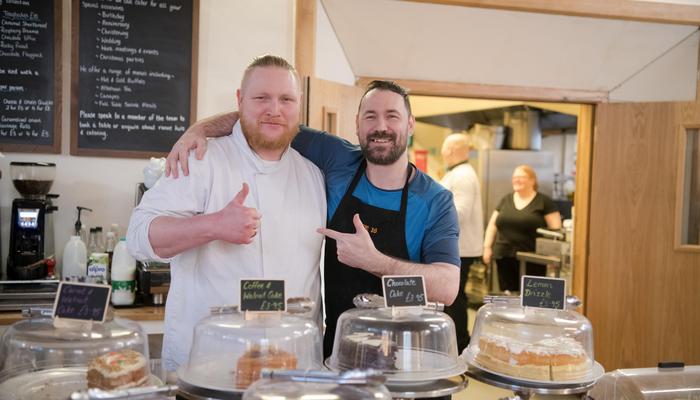
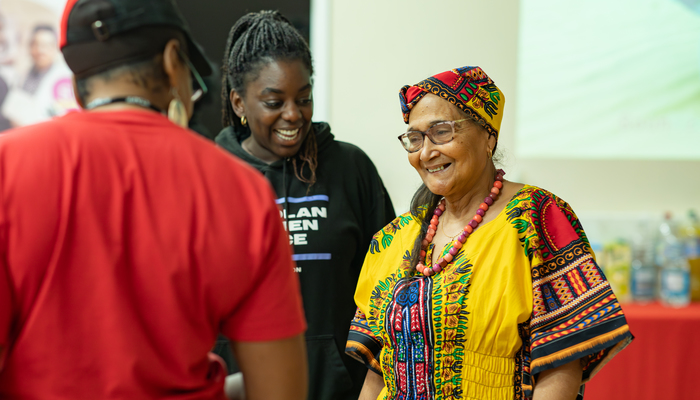
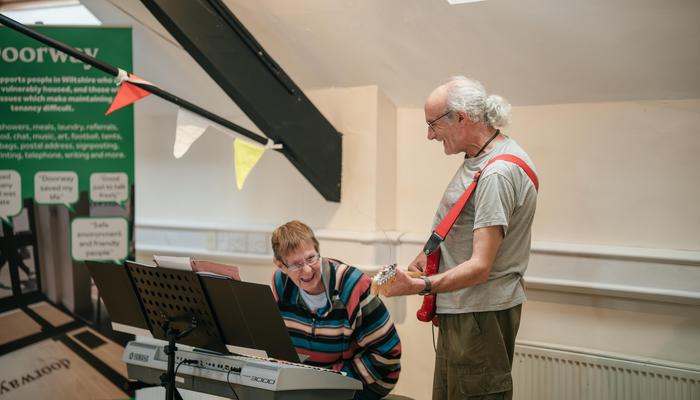
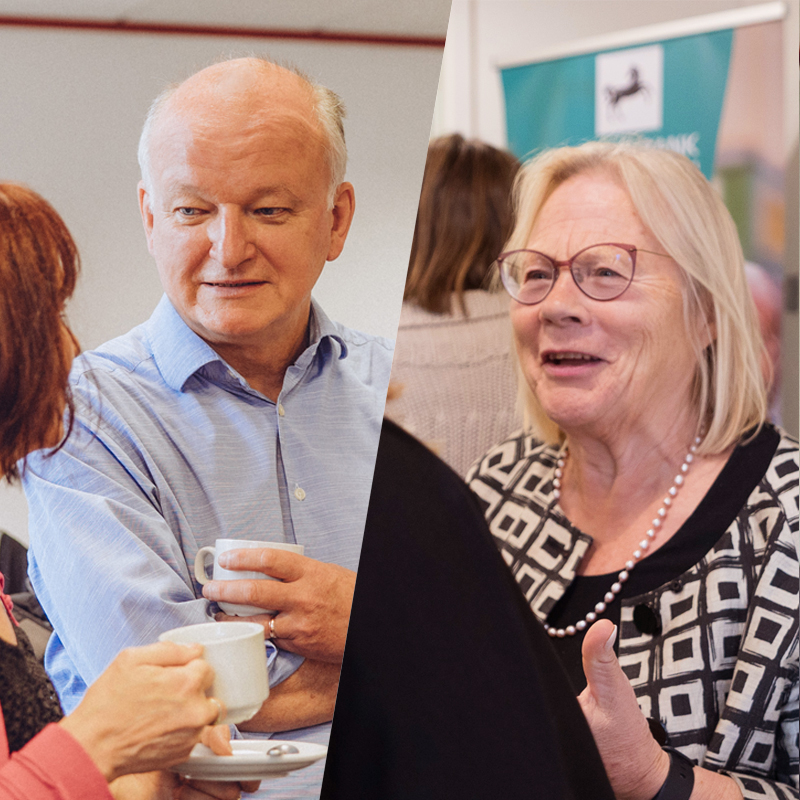
In 2023, amid a cost of living crisis, small and local charities continued to bridge the gap in public services.
We sought to strengthen hundreds of small charities across England and Wales with flexible unrestricted funding and tailored support aimed at helping them overcome challenges and develop their capacity and services.
We continued our work in communities, bringing together local organisations to design and deliver services that effectively meet the needs of local people.
We also used our platform to influence the UK Government, championing the expertise and experience of small charities and the people they serve and advocating for them to get the support they need.
In the first full year of implementing our strategy, Building a Better Future, we focused all our work around achieving impact in four areas: strengthening resilience, building connections, amplifying voices and championing equity. You can read more about our progress in each of these areas below.
“Despite ongoing challenges, the inspiring passion and strength of the people, communities and organisations we work with encourages us that we can collectively create a more just and compassionate society.”
- Paul Streets, our outgoing Chief Executive, and Dame Ann Limb DBE DL, Chair of Trustees, Lloyds Bank Foundation for England and Wales (pictured above)

awarded in funding in total
small charities supported through our grants programmes
people supported by our charity partners
We partner with small and local charities addressing some of society's most complex issues such as homelessness, domestic abuse and addiction, helping people to rebuild their lives and thrive. The map below shows the number of charities we supported in each region of England and Wales in 2023.

North East: 44 charities
North West: 97 charities
Yorkshire and Humber: 62 charities
East Midlands: 52 charities
Wales: 61 charities
West Midlands: 56 charities
East of England: 44 charities
London: 135 charities
South West: 56 charities
South East: 70 charities
awarded in funding to small specialist charities working in eight key areas:
awarded in funding to organisations run by and working for people who have faced inequity because of their race or ethnicity.
awarded in funding to small and local charities led by and working with Deaf and Disabled people who are experiencing disadvantage and poverty.

To ensure that charities could continue to provide vital support to people who needed it most, we strengthened their resilience with unrestricted funding and bespoke organisational development support, alongside advocating for greater government support. This enabled our charity partners to continue to do what they do best, adapt to challenges, and help more people.
charities supported through grants programmes
charities supported with our organisational development support
Lloyds Banking Group colleagues shared their skills and expertise with 110 charities
Ella’s is a London-based charity supporting survivors of trafficking and sexual exploitation. Ella’s received a £50,000 grant over two years under our Specialist Programme.
"It’s been amazing to get funding that isn't restricted from the Foundation. We’ve been able to fund core staff and open another safe house which has been a huge achievement. Ultimately, this means we can support more women.
The combination of funding alongside non-financial development support offered by the Foundation is amazing. Getting funding for core staff has meant that we have the time and resources to be able to engage with the additional capacity building support.”
- Minke Van Til, Co-Director, Ella’s.
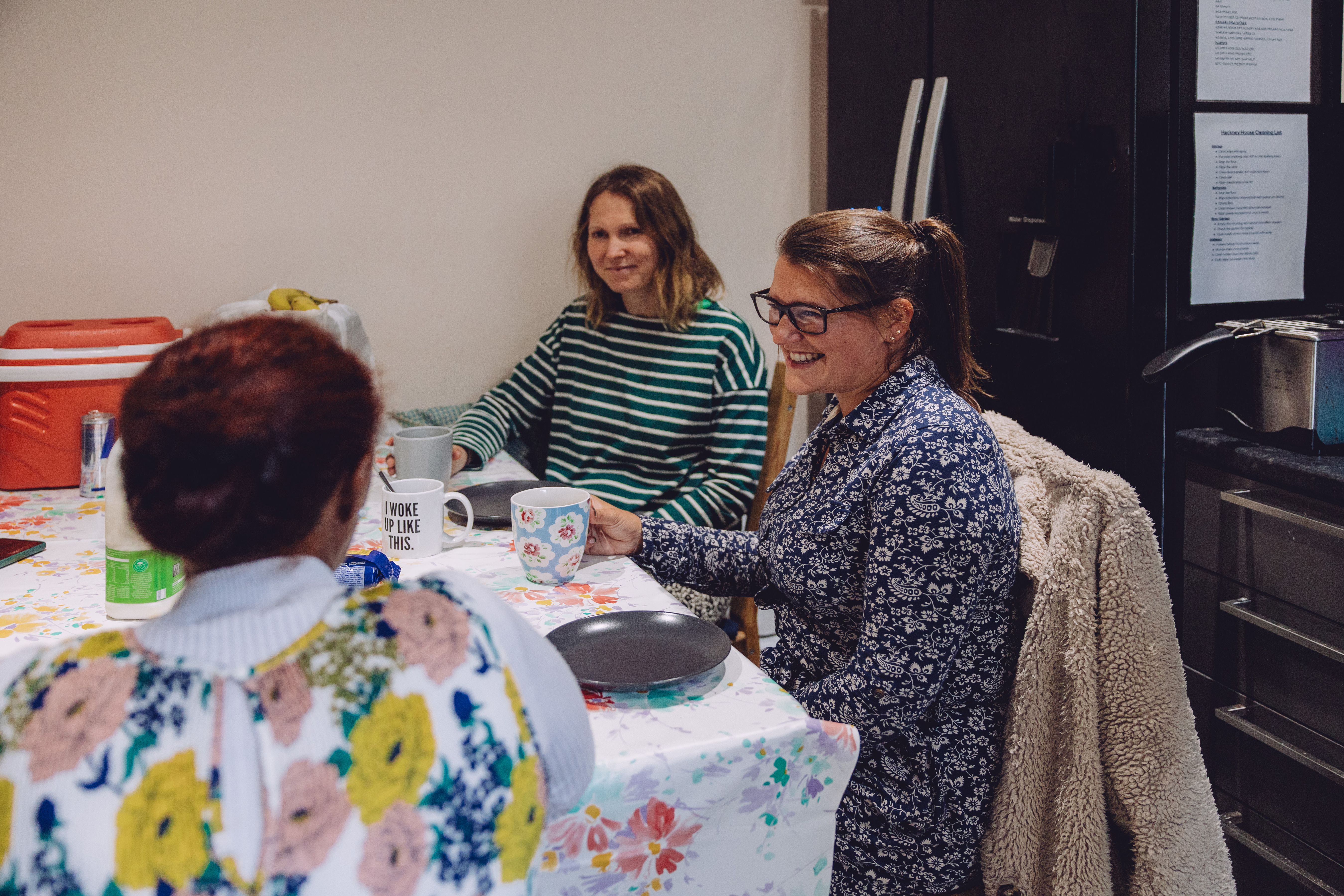
Minke Van Til, Co-director of Ella's (left), and Charlotte Davis, trustee.

We helped to bridge the gaps between charities and other local organisations by providing opportunities for them to connect through networks, forums and learning events so they can support each other, develop together, and collaborate to improve outcomes for everyone in their communities. These connections can lead to sustainable change in society, ensuring that people facing complex issues get the support they need.
people connected through networking opportunities such as Peer Forums and Action Learning Sets
communities strengthened through collaborative working and projects
charities contributed to the Welsh Small Charities Forum which we set up in 2023
We continued our People and Communities work in six communities across England and Wales, bringing together local organisations and groups to find new ways of designing and delivering services so that people facing complex issues can get the support they need in the ways that work best for them. The issues being tackled collectively in communities include homelessness, children’s and young people’s mental health services, and food inequality.
We also continued our partnership and investment in LocalMotion, working alongside four other funders to bring people and organisations together to influence change in six places. Each community has now produced a local action plan, with the aim of tackling the root causes of social, environmental, and/or economic injustice.
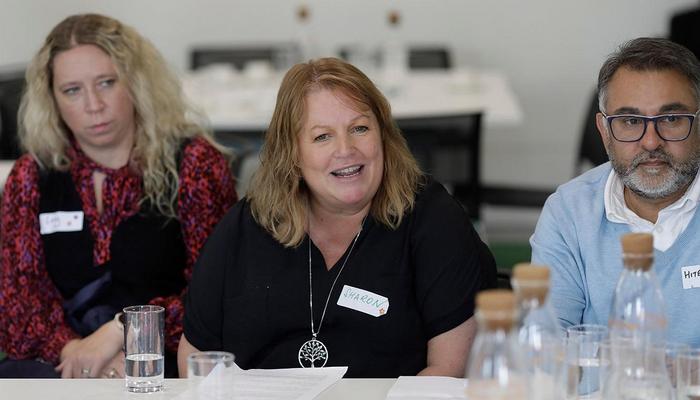
Sharon Chappell (middle), former Local Implementation Lead for our People and Communities work in Redcar and Cleveland.
“We’ve now managed to bring people together from charities, funders, housing associations, local businesses, the NHS and the local authority. People are starting to feel excited and inspired about what could be possible, and the opportunities to work together and make positive changes.”
– Sharon Chappell, Local Implementation Lead for our People and Communities work in Redcar and Cleveland.

We equipped small charities to share their expertise and experience with local and national decision makers to improve the policies that are failing the communities they serve and ensure that people with lived experience of disadvantage are heard by those in power. We also used our own platform to advocate for our charity partners and raise awareness of the issues facing the people they support.
We are helping small charities influence change in three key areas, focused on addressing some of the most pressing issues that are driving disadvantage in society:

Our National Influencing Programme awarded grants of up to £150,000 over three years to 18 charities and partnerships seeking to improve systems and services by influencing government policy and practice.

We launched a new funding programme to support local collaborations led by small charities seeking to influence practice and policy in their region.

We submitted 11 responses to government consultations and parliamentary inquiries in England and Wales.
Through our influencing work with government, we ensure that policymakers hear the voices, concerns and solutions of small charities and the people they support.
Building on our report, Deductions: Driver of Poverty, we were invited to give evidence to the Work and Pensions Committee in 2023, specifically focusing on how deductions to benefits are leaving many people struggling to afford essentials. We were delighted that our recommendations for change were backed by the MPs and we continue to encourage the Government to act so that more people can be adequately supported by the social security system.
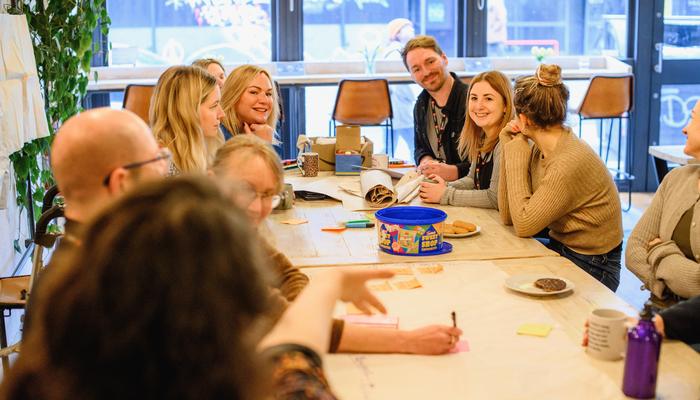
A group of staff and volunteers at the Justlife hub in Brighton.
Justlife received a £147,981 grant over three years under our National Influencing Programme. Justlife supports people that are living in temporary accommodation in Brighton and Manchester, as well as advocating for people living in temporary accommodation at a national level.
“We’re passionate about including people with lived experience in our advocacy work. We want their voices to be heard by decision makers at a national level so that systems can be changed so that people can access appropriate accommodation and support.
As a small charity we can’t help everyone individually, but if we can have an impact on systems nationally then we can help make temporary accommodation short, safe and healthy for everyone.”
– Simon Gale, CEO, Justlife.
Read the full case study here.

We live in a society where not everyone has access to the same opportunities to thrive because of who they are or where they’re from. We’re committed to challenging structural barriers in society, reducing inequity between groups, and ensuring that our work is truly inclusive.
Poverty rates are higher among families where at least one member is Disabled, and relative poverty rates are highest among racially minoritised communities. That’s why we’ve committed at least 50% of our funding to charities led by and for Deaf and Disabled people and people facing inequity because of their race or ethnicity.
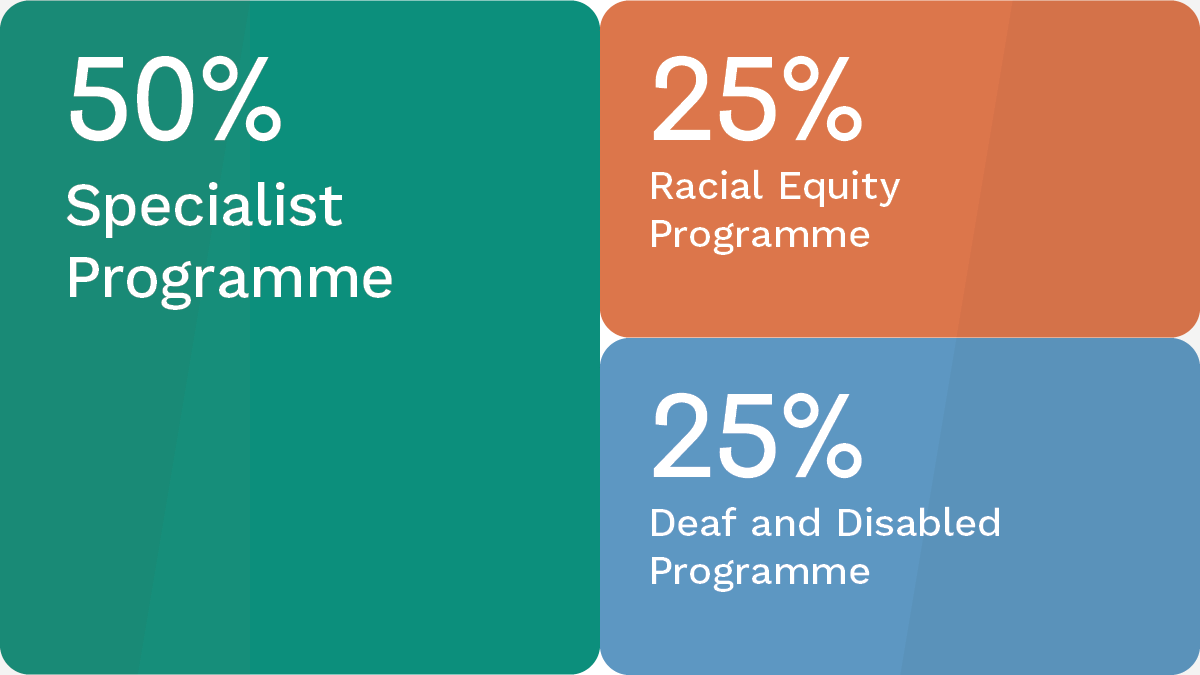
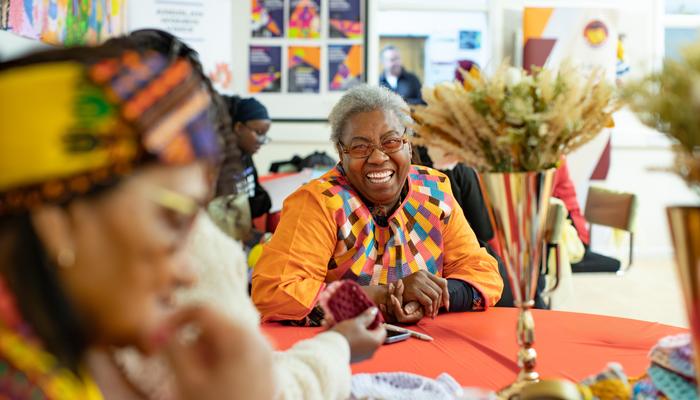
People socialising at a community event run by the Mojatu Foundation in Nottingham.
“I struggled to find community here in the UK, especially people that speak the same language. But me and my family have been able to find a community here and that's been very helpful. Mojatu embraces different cultures and has a spirit of family where we can all be seen and understood.”
- Refugee supported by the Mojatu Foundation, a charity funded under our Racial Equity programme.
We recognise that we have power and privilege as a funder. We want to improve our approaches and practices to make them more accessible and include people with lived experience in our processes so that we can shift power and decision-making from us to people facing complex issues.
For our Racial Equity and Deaf and Disabled People’s Organisations programmes, we recruited people with lived experience to join the panels that decide which applications will be funded. For our National Influencing Programme, we included people with lived experience in the application assessment stage as well, so they were involved in choosing which applications would be shortlisted for the final panel.

We are now mid-way through our five-year strategy, Building a Better Future, which we launched at the end of 2022. We continue to evaluate our progress against the ambitious goals we set ourselves, to ensure that we are dedicating our skills and resources where they are needed most. Learn more below.
Read our 2022-2026 strategy: Building a Better Future, and how we will partner with small charities, people, and communities working towards a more just and compassionate society.
In recent years, funders and frontline charities have witnessed extraordinary social, health, and economic challenges. At the end of our Reaching Further strategy we reflected on what we learned, what worked well and the mistakes we made. Read these lessons in full in our Lessons for Funder Practice report.

"As a charity we really welcome this relationship-based model because the more traditional approach to grant-making can feel quite transactional. We’ve had a really positive partnership with the Foundation. Carlos, our Regional Manager, has been amazing to work with. He is our consistent point of contact and has supported us throughout."
Victoria Ashley, CEO, Ripon Community Link